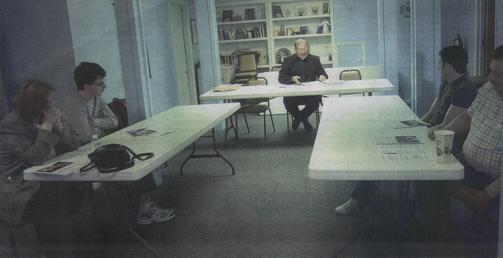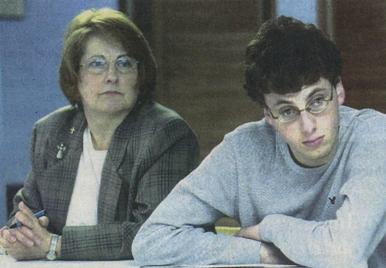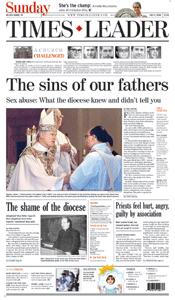A Church Re-Educates Itself
Changing Attitudes: The Catholic Church Has Mandated Special Training to
Recognize Sexual Abuse and Abusers
By Mark Guydish mguydish@leader.net
Times Leader
July 9, 2006
http://www.timesleader.com/mld/timesleader/14998995.htm
[See other articles in this feature:
- The
Sins of Our Fathers, by Dave Janoski, Times Leader (7/9/06)
- The
Shame of the Diocese: Allegations? Move Father Caparelli. More Allegations?
Move Father Caparelli. Convictions? Keep Quiet, by Dave Janoski, Times
Leader (7/9/06)
- Priests
Feel Hurt, Angry, Guilty by Association: When Scandal Breaks, Say Innocent
Pastors, They and Flock Get Caught in Turmoil, by Mary Therese Biebel,
Times Leader (7/9/06)
- Bill
Aims to Loosen Limits on Suits: Statutes of Limitations on Sex-Abuse Cases
Often Leave Victims with No Options, by Dave Janoski, Times Leader
(7/9/06)
- Crimes
and Accusations, Times Leader (7/9/06) [summaries, assignments, and
photos of accused priests]
- Morning
Note from the Newsroom: the Church Series, by Matt Golas, Times Leader
(7/11/06).]
It's a sunny spring Saturday in a still sleepy Montrose and Gerard "Father
Gerry" Safko flashes a disarmingly warm smile in the chilly basement
of the Holy Name of Mary Church rectory. He offers a few quips about a
failed turkey hunt before settling into serious business: Child sex abuse.
 |
| Rev Gererd Safko presides over a VIRTUS
training session held at Holy Name of Mary in Montrose in April. While
the group was small this time, the program is vast, training most
staff and volunteers in the 11-county Scranton Diocese. |
Safko comes across as easy going, but he has taken on the heavy task
as facilitator, or trainer, for the VIRTUS program, adopted by the Diocese
of Scranton in the wake of the priest sex scandals. Every cleric, every
employee, every volunteer who deals regularly with children, throughout
the 11 county diocese gets some training to recognize suspicious behavior,
prevent abuse and report concerns. There is a separate program for Catholic
school students.
This is not optional. It is a mandate promulgated by the United States
Conference of Catholic Bishops as part of the Charter for the Protection
of Children and Young People, enacted in 2002. That makes the Catholic
Church a rarity.
By comparison, other organizations often make such training optional.
The Boy Scouts of America, for example, have a voluntary online course.
The National YMCA provides manuals that local organizations can incorporate
into their training.
While the state Department of Education has many safeguards against abuse
of minors by teachers – spokesman Michael Storm cited mandatory background
checks, mandatory abuse reporting, a ban on hiring teachers convicted
of abuse, and a strict teacher code of conduct – the state doesn't expressly
require training similar to what the church now calls for.
When the Conference of Catholic Bishops agreed to require the training,
it left details up to each diocese. The Scranton Diocese, like others
including Philadelphia, opted for the VIRTUS program developed, according
to a press release, "by The National Catholic Risk Retention Group,
Inc. of Lisle, Ill. a non-profit organization that provides risk control
services to one-third of the Catholic dioceses in the U.S."
 |
| Martina Lingobardo and Jeffrey Keyes take
part in a VIRTUS training session held at Holy Name of Mary Parish
in April. They agreed that segments of the program about child sex
abuse were 'powerful.' |
Though trademarked in all capital letters, "VIRTUS" is not
an acronym. Rather, the company Web site explains, it is a word that "derives
from Latin, and means valor, moral strength, excellence, and worth. In
ancient times, virtus denoted a way of life and manner of behavior that
always aspired to the highest, most positive attributes of people and
aspects of human interaction."
The diocese asks for volunteers, such as Safko, to become facilitators,
who go through all-day sessions. "Our goal is to have a broad range
of individuals participating, in particular lay people," Diocese
Spokesman Bill Genello wrote. "Currently there are two priests, two
deacons, several women religious, as well as teachers, school principals,
Diocesan personnel, etc." All told, there are 25 facilitators now.
The costs are adding up. In the three years since launching VIRTUS, The
Diocese of Scranton has spent more than $314,000 training roughly 13,000
people. That includes paying for about 7,000 of them to register for more
training and updates through an online component, and a companion program
for children from kindergarten to grade 10.
And there is no end in sight, Genello said. "The program will go
on indefinitely."
Why? Safko summed it up to the four people attending the April 29 session,
his third so far (a light crowd because it was scheduled for those who
had missed earlier sessions): "We are the eyes and ears of the diocese,
and of God."
This, he concedes, is a different attitude from the pre-scandal church.
"Years ago, we treated (abuse) like alcoholism, like an addiction,"
he said, trying to fix it by reprimanding a priest and putting him in
another assignment. "It didn't work. So the only option now is whoever
is suspected is dismissed, temporarily at first while an investigation
continues, then permanently" if the allegations prove true.
"There have been very, very few false reports," Safko said.
One study found 5 percent of all abuse reports were falsely made, "And
that was by adults. Only 1 percent were falsely made by kids.
"I do know of one case that was a lie. A priest, who was a friend
of mine, was accused of fondling a girl," Safko said, adding that
this occurred in different diocese. "He told me 'I have no attraction
to girls. I have no attraction to boys. I'm a gay man.'" Even so,
the accused priest was put through "a barrage of tests" before
the charges were deemed unfounded. In the end, "he didn't leave the
priesthood because of that. He left the priesthood because he fell in
love with another man."
 |
| 'Those abused as children can become abusers,'
Father Gerard Safko tells his trainees during a lesson about how to
detect and prevent sex abuse. 'The cycle has to stop.' |
Such straight talk peppered the three-hour session. Safko made it clear
he believes the only way to prevent abuse is to face its many ugly facets
head on. The centerpiece of the training, two videos, reinforced that
attitude, featuring abusers discussing their tactics and experts giving
stern advice and stark statistics supplemented by Safko:
• The abused often become abusers. "The cycle must stop,"
Safko said.
• They might start abusing children when they are still children
themselves.
• One study of abusers found that 11 percent of all abusers were
strangers, 29 percent were relatives, and 60 percent were people known
to the victim.
• Of all church-related abuse, about half the cases were committed
by volunteers.
• Twenty-one percent of men who molested boys were gay. As Safko
later noted, an abusers sexual orientation isn't what compels the abuse.
A lack of sexual maturity is the primary culprit for pedophilia.
• Abuse rates in the general population are stark. Estimates run
up to one in every 10 males being abused before becoming an adult. For
females, the top estimate is one in every five.
• No one is sure how many people are attracted to minors, but estimates
for the general population – as well as for priests – range up to 7 percent.
Relatively few will actually respond to those impulses and abuse a child.
Abusers in the videos talked glibly of tactics, of how they hung around
children, gained their confidence and won the parents' trust. They not
only groom the child, one expert warned, they groom the caregiver. They
can be personable, even charismatic.
Victims gave bleak accounts of their sagas. "I tried to kill myself
when I was 15," one boy said.
"When our daughter was molested, it nearly destroyed our parish,"
a woman said. "And for a long, long time I lost my faith."
After the first video, Safko sought reactions from his trainees.
"Powerful," replied Jeffrey Keyes from St. John the Evangelist
in Susquehanna. "I thought it was very powerful, but disturbing."
Others echoed the sentiment.
Safko, who underwent a full day's training to become a facilitator, told
them, "My first reaction was that I was angry, and also a little
guilty because of the role we all play with children. ... My biggest fear
is that we would be afraid to be with children. We can't be afraid to
have feelings of love for children, but in a healthy way.
"Children who are not touched develop problems, too."
Safko lost a bit of his ease when he explained the psychology that prompts
an adult to molest a child. He hesitated, looking for a clear way to explain
a complex concept experts in the videotapes had only touched on. "They
are psychosexually … slow … their development has been arrested. They
have not progressed into a healthy adult sexuality." That means they
are attracted to the lack of physical sexual development in children:
the smooth, hairless skin; the softer, younger features.
The second video outlined a five-step plan to prevent abuse.
• Know the signs, including suspicious behavior by adults around
kids: Giving inappropriate gifts, touching children excessively, showing
more excitement when with children than with adults, ignoring basic rules
by inviting kids to their home or other private places, and letting the
children do things their parents forbid.
• Control access to children in church settings, starting with mandatory,
standardized, written application forms for volunteers and staff, background
checks and face-to-face interviews.
• Monitor programs for kids, making sure you know where the child
is at all times, restricting access – by both children and adults – to
secluded areas. Parents should always feel free to visit a program their
kids are in.
• Be aware of what is going on in your child's life. Talk to them
and make sure they know they can talk to you, and that you really listen.
• If you suspect something, tell someone. "You don't need proof
to give your observations," Safko said. "You are not accusing,
you are just pointing out.
"Let the authorities do their jobs. If there's nothing there, there's
nothing there. If there is, you prevented something worse. The most important
thing is to admit our human frailty."
|



